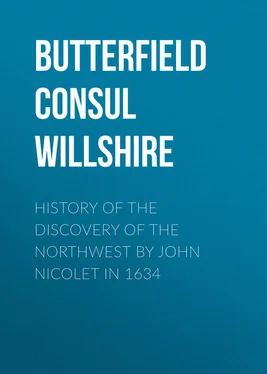Consul Butterfield - History of the Discovery of the Northwest by John Nicolet in 1634
Здесь есть возможность читать онлайн «Consul Butterfield - History of the Discovery of the Northwest by John Nicolet in 1634» — ознакомительный отрывок электронной книги совершенно бесплатно, а после прочтения отрывка купить полную версию. В некоторых случаях можно слушать аудио, скачать через торрент в формате fb2 и присутствует краткое содержание. ISBN: , Жанр: foreign_antique, foreign_prose, на английском языке. Описание произведения, (предисловие) а так же отзывы посетителей доступны на портале библиотеки ЛибКат.
- Название:History of the Discovery of the Northwest by John Nicolet in 1634
- Автор:
- Жанр:
- Год:неизвестен
- ISBN:http://www.gutenberg.org/ebooks/36698
- Рейтинг книги:5 / 5. Голосов: 1
-
Избранное:Добавить в избранное
- Отзывы:
-
Ваша оценка:
- 100
- 1
- 2
- 3
- 4
- 5
History of the Discovery of the Northwest by John Nicolet in 1634: краткое содержание, описание и аннотация
Предлагаем к чтению аннотацию, описание, краткое содержание или предисловие (зависит от того, что написал сам автор книги «History of the Discovery of the Northwest by John Nicolet in 1634»). Если вы не нашли необходимую информацию о книге — напишите в комментариях, мы постараемся отыскать её.
History of the Discovery of the Northwest by John Nicolet in 1634 — читать онлайн ознакомительный отрывок
Ниже представлен текст книги, разбитый по страницам. Система сохранения места последней прочитанной страницы, позволяет с удобством читать онлайн бесплатно книгу «History of the Discovery of the Northwest by John Nicolet in 1634», без необходимости каждый раз заново искать на чём Вы остановились. Поставьте закладку, и сможете в любой момент перейти на страницу, на которой закончили чтение.
Интервал:
Закладка:
If he should fail in discovering a new highway to the east in reaching these "People of the Sea," it would, in any event, be an important step toward the exploration of the then unknown west; and why should not the explorer, in visiting the various nations living upon the eastern and northern shores of Lake Huron, and beyond this inland sea, create friends among the savage tribes, in hopes that a regular trade in peltries might be established with them. To this end, he must meet them in a friendly way; have talks with them; and firmly unite them, if possible, to French interests. Champlain knew, from personal observation made while traveling upon the Ottawa and the shores of the Georgian bay of Lake Huron – from the reports of savages who came from their homes still further westward, and from what fur-traders, missionaries, and the young men sent by him among the savages to learn their languages (of whom Nicolet himself was a notable example) had heard that there were comparatively easy facilities of communication by water between the upper country and the St. Lawrence. He knew, also, that the proper time had come to send a trusty ambassador to these far-off nations; so, by the end of June, 1634, Nicolet, at Quebec, was ready to begin his eventful journey, at the command of Champlain.
Конец ознакомительного фрагмента.
Текст предоставлен ООО «ЛитРес».
Прочитайте эту книгу целиком, купив полную легальную версию на ЛитРес.
Безопасно оплатить книгу можно банковской картой Visa, MasterCard, Maestro, со счета мобильного телефона, с платежного терминала, в салоне МТС или Связной, через PayPal, WebMoney, Яндекс.Деньги, QIWI Кошелек, бонусными картами или другим удобным Вам способом.
1
Ancestors of the present Winnebagoes.
2
The proper spelling is "Nicolet," not "Nicollet," nor "Nicollett." The correct pronunciation is "Nick-o-lay." The people of the province of Quebec all pronounce the name "Nicoll ette ," though improperly, the same as the word would be pronounced by English-speaking people if it were spelled "Nick-o-let." But it is now invariably written by them "Nicolet."
3
Vimont, Relation , 1643 (Quebec edition, 1858), p. 3. The Jesuits, intent upon pushing their fields of labor far into the heart of the continent, let slip no opportunity after their arrival upon the St. Lawrence to inform themselves concerning ulterior regions; and the information thus obtained was noted down by them. They minutely described, during a period of forty years, beginning with the year 1632, the various tribes they came in contact with; and their hopes and fears as to Christianizing them were freely expressed. Accounts of their journeys were elaborated upon, and their missionary work put upon record. Prominent persons, as well as important events, shared their attention. Details concerning the geography of the country were also written out. The intelligence thus collected was sent every summer by the superiors to the provincials at Paris, where it was yearly published, in the French language. Taken together, these publications constitute what are known as the Jesuit Relations . They have been collected and republished in the same language, at Quebec, by the Canadian government, in three large volumes. As these are more accessible to the general reader in this form than in the original (Cramoisy) editions, they are cited in this narrative.
There is no complete translation of the Relations into the English language. Numerous extracts from the originals bearing particularly upon the West – especially upon what is now Wisconsin – were made some years since by Cyrus Woodman, of Mineral Point, translations of which are to be found in Smith's history of that State, Vol. III., pp. 10-112. But none of these are from the Relation of 1643 – the most important one in its reference to Nicolet and his visit to the Northwest.
4
"Jean Nicollet né à Cherbourg, était fils de Thomas Nicollet, messager ordinaire de Cherbourg à Paris, et de Marie La Mer." – Ferland's Cours d'Histoire du Canada (1861), Vol. I., p. 324, note. But, in his "Notes sur les Registres de Notre-Dame de Québec" (Quebec, 1863, p. 30), he corrects the mother's name, giving it as in the text above. That this was her real name is ascertained from the Quebec parochial register, and from Guitet's records (notary) of that city.
5
Il [Nicolet] arriua en la Nouuelle France, l'an mil six cents dixhuict. Son humeur et sa memoire excellente firent esperer quelque chose de bon de luy; on l'enuoya hiuerner auec les Algonquins de l'Isle afin d'apprendre leur langue. Il y demeura deux ans seul de François, accompagnant tousiours les Barbares dans leurs courses et voyages, auec des fatigues qui ne sont imaginables qu'à ceux qui les ont veües; il passa plusieurs fois les sept et huiet iours sans rien manger, il fut sept semaines entieres sans autre nourriture qu'vn peu d'escorce de bois." – Vimont Relation , 1643, p. 3. (The antiquated orthography and accentuation of the Relations are strictly followed in the foregoing extract; so, also, in all those hereafter made from them in this narrative.)
"On his [Nicolet's] first arrival [in New France], by orders of those who presided over the French colony of Quebec, he spent two whole years among the Algonquins of the island, for the purpose of learning their language, without any Frenchman as companion, and in the midst of those hardships, which may be readily conceived, if we will reflect what it must be to pass severe winters in the woods, under a covering of cedar or birch bark; to have one's means of subsistence dependent upon hunting; to be perpetually hearing rude outcries; to be deprived of the pleasant society of one's own people; and to be constantly exposed, not only to derision and insulting words, but even to daily peril of life. There was a time, indeed, when he went without food for a whole week; and (what is really wonderful) he even spent seven weeks without having any thing to eat but a little bark." – Du Creux, Historia Canadensis , Paris, 1664, p. 359. "Probably," says Margry, "he must, from time to time, have added some of the lichen which the Canadians call rock tripe." — Journal Général de l'Instruction Publique , Paris, 1862.
6
"Il [ Nicolet ] accompagna quatre cents Algonquins, qui alloient en ce temps là faire la paix auec les Hiroquois, et en vint à bout heureusement. Pleust à Dieu qu'elle n'eust iamais esté rompuë, nous ne souffririons pas à present les calamitez qui nous font gemir et donneront vn estrange empeschement à la conuersion de ces peuples. Apes cette paix faite, il alla demeurer huict ou neuf ans auec la nation des Nipissiriniens, Algonquins; là il passoit pour vn de cette nation, entrant dans les conseils forts frequents à ces peuples, ayant sa cabane et son mesnage à part, faisant sa perche et sa traitte." – Vimont, Relation , 1643, p. 3.
7
"I'ay quelques memoires de sa main, qui pourront paroistre vn iour, touchant les Nipisiriniens, auec lesquels il a souuent hyuerné." – Le Jeune, Relation , 1636, p. 58.
8
"Il [ Nicolet ] fut enfin rappallé et estably Commis et Interprete." – Vimont, Relation , 1643, p. 3.
Читать дальшеИнтервал:
Закладка:
Похожие книги на «History of the Discovery of the Northwest by John Nicolet in 1634»
Представляем Вашему вниманию похожие книги на «History of the Discovery of the Northwest by John Nicolet in 1634» списком для выбора. Мы отобрали схожую по названию и смыслу литературу в надежде предоставить читателям больше вариантов отыскать новые, интересные, ещё непрочитанные произведения.
Обсуждение, отзывы о книге «History of the Discovery of the Northwest by John Nicolet in 1634» и просто собственные мнения читателей. Оставьте ваши комментарии, напишите, что Вы думаете о произведении, его смысле или главных героях. Укажите что конкретно понравилось, а что нет, и почему Вы так считаете.












